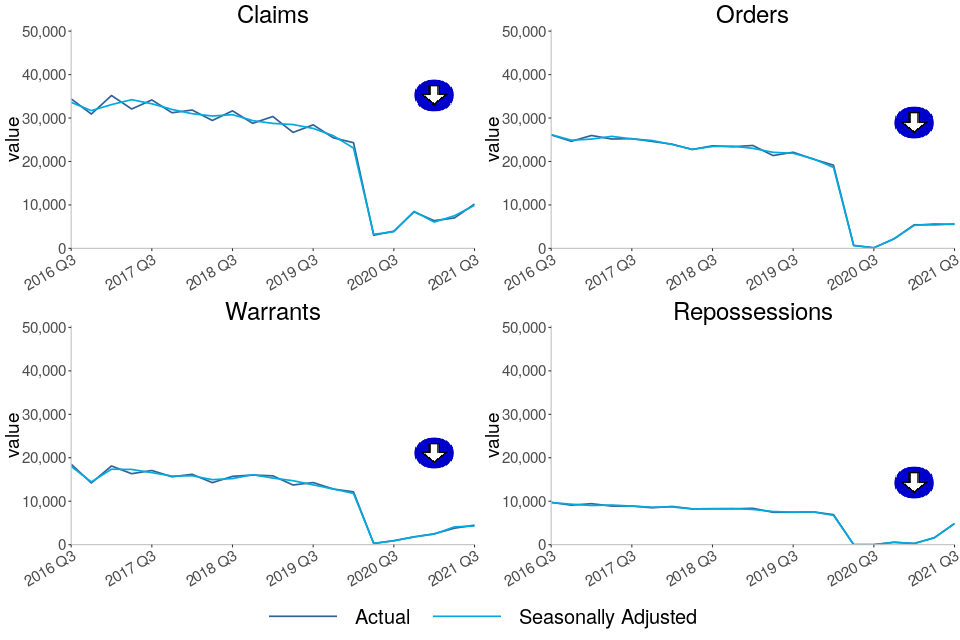 The number of landlord possession actions for all court stages have increased compared to the same quarter of last year but remains significantly reduced in comparison to the same quarter in 2019.
The number of landlord possession actions for all court stages have increased compared to the same quarter of last year but remains significantly reduced in comparison to the same quarter in 2019.
As a consequence of coronavirus and associated policy actions, all landlord possession actions have dropped significantly. Compared to the same quarter in 2019, landlord possession actions; claims (10,202), orders for possession (5,600), warrants (4,492) and repossessions (4,853) have decreased by 64%, 75%, 69% and 35% respectively.
In July to September 2021, a far fewer proportion – 36% or 3,681 – of all landlord possession claims were social landlord claims, and 21% – 2,148 – were accelerated claims. The group making up the largest proportion of landlord claims – 43% or 4,373 – were private landlord claims.
This contrasts with previous quarters. For example, in July to September 2019, the majority – 62% or 17,629 – of all landlord possession claims were social landlord claims, and accelerated claims and private landlord claims made up just 17% and 21% of all landlord claims respectively.
The fall in claim and orders volumes is observed across all geographical regions. As in previous quarters, a concentration was seen in London, with 2,712 landlord claims and 1,537 landlord orders at London courts in July to September 2021, accounting for 27% of all landlord possession claims and orders respectively. Despite this, in London, there was still a decrease of 59%, from 6,638, for landlord claims and a decrease of 67% for landlord orders (from 4,724 in July to September 2019).
The 69% decrease in landlord warrants compared to July to September 2019, was again accompanied by large decreases across all regions. The largest regional number – 1,410 – was found in London, making up 31% of all landlord warrants. Despite this, there was a decrease of 60% for landlord warrants in London – from 3,542 in July to September 2019 to 1,410 in July to September 2021.

Timothy Douglas, policy manager at Propertymark comments: “Looking back to 2016, the figures have been on a steady downwards trajectory for a number of years, throughout the pandemic in particular letting agents have worked tirelessly, communicating between landlords and tenants to resolve issues by negotiating rent reductions and offering mediation along the way.
“This work hasn’t gone unnoticed as this quarter shows a significant decrease in the number of landlord possessions compared to the same time pre-pandemic in 2019.
“Whilst there are many steps that can be explored before eviction, for some landlords and letting agents, the tough decision of an eviction has had to be made, but ultimately, it’s important to realise that nearly half of all landlords have just one rental property and are faced with the same financial pressures as others – 54 per cent of landlords have but to let mortgages on their rented properties and ultimately must factor that in to their decisions when facing tenant issues.
“With reform still on the cards for the private rented sector, we hope that decision makers take note of these figures and realise that abolishing section 21 is not the silver bullet some think it is.”



The figures show that when there was a 6-4 month notice period and the courts were closed due to Covid, that there was a huge drop in all action? SHOCKER!
Anyone who thinks that removing section 21’s is a good thing (without replacing it with a more efficient method to evict tenants), is a few brain cells short of a lemon.
Would be nice to see a side by side comparison of this “data” against tenant arrears for the same period.
You must be logged in to like or dislike this comments.
Click to login
Don't have an account? Click here to register
Getting rid of S21 is not necessarily the issue that worries most, my worry is what is it going to be replaced by? And how strict are the rules going to be? What happens if you have a tenant that has caused lots of little issues with a wide range of neighbours, but none to the point of having an ASBO? How can you prove anti-social/nuisance or harassment of neighbours?
I think having to give A reason for telling someone to leave their home is great. No-one should just be told “I don’t want you there, get lost” but the courts still need to remember that this is the Landlord’s property. If I don’t want to let my daughter use my laptop, even if I have previously said she could, because she didn’t charge it/close it down properly/left crumbs or whatever, I should not be forced to. If the Landlord is sick of getting little niggly complaints from neighbours, then they should be able to give the appropriate amount of time and get their house back.
You must be logged in to like or dislike this comments.
Click to login
Don't have an account? Click here to register
Landlords are basically being told you have no rights once you rent out a property. It is a regime of the civil service and the far left politicians. They are not listening to; landlords do not throw out well behave tenants and taking away the only tool left in the industries arsenal that maintains a general level of good behaviour in the sector.
The industry will evolve (already happening) into more and more tenants being rejected and remain homeless, that might have been accommodated.
You must be logged in to like or dislike this comments.
Click to login
Don't have an account? Click here to register